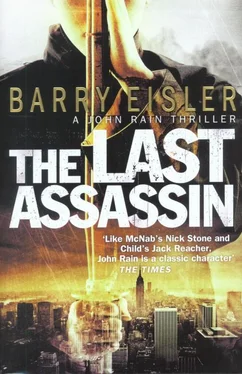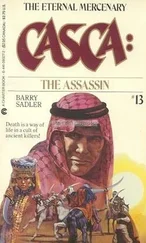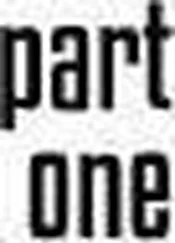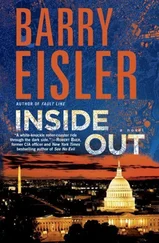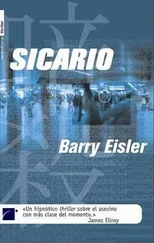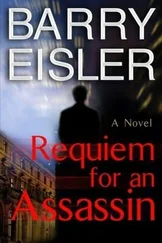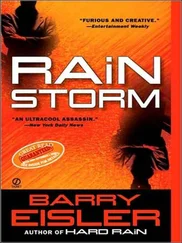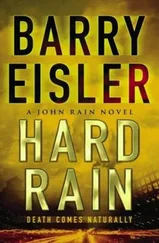
Barry Eisler
The Last Assassin
The fifth book in the John Rain series, 2006
For my brother and sister, Alan and Judith
I've never liked doing a job in a new place. You don't know how to get in and out undetected, you don't know what tools you'll need to access the target, you don't know where you'll stick out and where you'll be able to fade into the background or disappear in a crowd.
To compensate, I start by studying the area from afar, move in only when I've learned as much as possible, and always arrive early enough to become familiar with the local terrain before it's time to act. Tactics like these have kept me alive, and even reasonably prosperous, during more than a quarter century of doing the thing I've always been best at.
But this time the preparation was reflex, not necessity. I wasn't on a job, for one thing; I was done with the life. Or almost done. There was one last thing, a big one, but I didn't want to face that just yet. Barcelona was supposed to be an interlude: pleasure, not business, and it was disturbing that some part of my mind seemed not to understand the difference.
Still, in alien circumstances, we tend to cling to habit, and so I found myself defaulting to my usual approach. I should have known better. Barcelona was unfamiliar, but the real territory I was trying to navigate isn't marked on any map.
I flew JAL from Tokyo via Amsterdam and arrived at Barcelona El Prat on a mild winter evening with nothing more than the plain carry-on bag in my hand and the cheap business suit on my back. On my feet were a pair of plain brown leather loafers, purchased in a mass market Aoyama men's store; on my nose, nonprescription steel-framed eyeglasses, calculated to obscure my features; in my pocket, a guidebook in Japanese. For my first days in the city, I would be an anonymous salaryman, recently divorced, his children grown and out of the house, seeking distraction through travel slightly more intrepid than last year's jaunt to Hawaii or Saipan. When Delilah arrived I would morph into something else.
The staff at Le Meridien hotel on Las Ramblas spoke their delightfully Catalan-accented English slowly, as my own halting, heavily Japanese-accented attempts indicated I would need. I certainly looked the part. My face is courtesy mostly of my Japanese father, and what vestiges my American mother contributed to the mix were diminished by surgery many years ago. The act came easily, too. I've had a lifetime to practice playing roles: no drama school training, true, but if you've lasted as long as I have in a business as literally cutthroat as mine, you learn a thing or two.
I was tired. Jet lag had been a nonissue in my thirties, a nuisance in my forties, and now it was more noticeable than ever. I went straight to my room, ate a room service meal, took a hot bath, and slept fitfully through the night.
I got up at dawn. I'd never been to Barcelona before, and wanted to see the city at first light, not yet on its feet, not yet wearing its makeup. I showered quickly and went out just as the sun was cresting the horizon. I scanned the street as I moved past the lobby window, then checked ambush positions from in front of the hotel. Everything looked fine.
I walked out to Las Ramblas, my breath fogging just slightly in the morning-chilled sea air, and paused. Ten meters down, three men in sanitation overalls and rubber boots were rolling up a dripping hose; the cobblestones were still slick from their work. I stood silently and didn't let them notice me. They finished with the hose, got in a truck, and drove off. When the sound of the engine had faded, it was followed only by silence, and I smiled, pleased to have the city to myself for a while.
I strolled east into the Barri Gòtic, the gothic quarter. I sensed I had arrived during a tenuous interlude between the departure of the night's last revelers and the morning's first arrivals, and I paused, enjoying the feeling that I was privy to some secret transition. I wandered for a long time, listening to my footfalls on the narrow stone streets, enjoying the aroma of fresh bread and ground coffee, watching as the area's residents gradually emerged from behind the centuries-old façades of scarred but stalwart dwellings to start another day.
After a breakfast of croissants and coffee cortado, I paid a visit to Ganiveteria Roca, a famous cutlery store I'd read about while preparing for the trip. There, among the pewter razors and steel scissors and related items, I selected a Benchmade folder with a three-inch blade. I'd gotten used to carrying a knife in the last year or so, and no longer felt comfortable without something sharp close at hand.
Now properly outfitted, I started my customary systematic exploration of the city. I wouldn't feel at ease here until I had learned how best to blend, or how to escape, should my attempts at blending fail. So I went everywhere, that day and for the five days and nights after, at all times, by all means of transit. I absorbed the layout of the streets and alleys; the location of police stations and security cameras; the rhythms and rituals of pedestrians and tourists and shopkeepers.
But there were so many distractions: the mingled smell of tapas and shawarma among the winding alleyways of El Raval; the sounds of music and laughter echoing in the public squares of Gràcia; the feel of the sea breeze on my face and in my hair on the peaks of Montjuic and Tibidabo. I liked that the locals took for granted morning mass in six-hundred-year-old cathedrals. I liked the contrasts: gothic and modernista; mountains and sea; historical weight and exuberant esprit.
And the distractions weren't limited to the city itself. I was also suddenly aware of parents with infants. They were everywhere: walking their babies in strollers, holding them in their arms, gazing at their small faces with crippling devotion. Tatsu, my sometime nemesis and current friend in the Keisatsucho, the Japanese FBI, had warned me this would be the case, and, as in so many other matters, he had been right.
What Tatsu hadn't prepared me for, what he couldn't, were the thousand other ways his news about Midori had left me ambivalent, confused, almost in shock. I had nearly canceled with Delilah, but then decided not to. I owed her an explanation, for one thing. I still wanted to see her, wanted it a lot, for another.
I never could have predicted the affection I'd developed for Delilah, or that she seemed to have developed for me. Certainly our initial encounters were inauspicious. First there was Macau, where we learned we were working the same target. Then Bangkok and Hong Kong, where she was supposed to be working me. And yet the inherent mistrust born of working for competing intelligence organizations – Delilah, for the Mossad, and I, freelance at the time for the CIA – had paradoxically provided a stable foundation. Each of us recognized in the other a professional, an operator with an agenda, someone for whom business imperatives would always trump personal desire. All of that became the basis for respect, even mutual understanding, and ultimately provided the context for the indulgence of undeniable personal chemistry. The sex couldn't lead anywhere, we both knew it. So why not enjoy what we had, whatever it was, for as long as it lasted?
But it did last, and it deepened. We spent a month together in Rio, after which Delilah had defied her paymasters when they ordered her to set me up. Defy, hell, she had very nearly betrayed them. She had warned me what was coming, and then worked with me to straighten things out. There must have been something between us, something worthwhile, if we had managed to avoid so many potentially lethal obstacles, and Barcelona was going to be the time and place to figure out what.
Читать дальше
